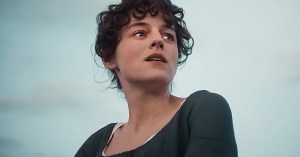The Best Films We Saw at Cannes 2018, Plus When You Can See Them Yourself
We bow down to Spike Lee's BlackKklansman, Palm d'Or winner Shoplifters, and some inspiring festival surprises.

Spike Lee, Topher Grace, and Adam Driver on the set of BlackKklansman. (Photo by David Lee / © Focus Features / Courtesy Everett Collection)
The 71st annual Cannes Film Festival is over, and it will be one for the record books. And not just for the films that screened there. It was a year of controversies and protests, as much as a year for great first-look cinema.
Netflix refused to submit its titles for the competition due to a rule change against streaming distributors. Jury President Cate Blanchett, along with 81 female filmmakers, actresses, and activists, stood on the steps of the Palais to demand greater access for female directors and gender parity in the festival competition. Black French actress Aïssa Maïga, accompanied by 15 others, staged a similar demonstration to protest racial and gender discrimination in the French film industry, proudly proclaiming “Black is not my job.” Kristen Stewart kicked off her shoes on the red carpet to clap-back against mandated heels for women. Ultimately, Thierry Frémaux signed the “Programming Pledge for Parity and Inclusion in Cinema Festivals,” committing to 50/50 gender parity by 2020.
But as with every year at Cannes, there were also films of note, splashy acquisitions, movies destined to languish without distribution, winners, and losers. The Jessica Chastain–Lupita Nyong’o thriller 355 had the biggest pickup of the festival, with Universal nabbing it for $20 million. SXSW darling, Jim Cumming’s Thunder Road, came away empty-handed again, despite sitting at 100% on the Tomatometer. A24’s Under the Silver Lake (61% on the Tomatometer), from It Follows director David Robert Mitchell, split critics and festivalgoers alike, despite an excellent performance by Andrew Garfield. And eventual Grand Prix winner, the Spike Lee-directed and Jordan Peele-produced BlacKkKlansman (95% on the Tomatometer) was the most talked about film of the festival.
Many of the films that bowed at Cannes are heading to our shores, and some are already entering Oscar conversations. Here are the seven buzziest films we saw at Cannes 2018 — you’ll definitely want to check them out when they reach theaters near you or on streaming services.
There were only three female filmmakers in competition this year, and two took home awards, including Alice Rohrwacher for Happy as Lazzaro, which tied for Best Screenplay alongside Nader Saeivar’s Three Faces. Along the Italian countryside, we meet Lazzaro, a young wide-eyed and guileless sharecropper whose innocence often marks him as simple-minded. Adriano Tardiolo is perfectly cast as Lazzaro, with an unassuming gaze and undeniable charm. We follow him and the rural farmers of his village as they bend under the yoke of modern advancement when – suddenly – the film magically morphs into a modern-day fable.
When can you see it? Acquired by Netflix, the film is expected for release sometime later this year in Latin and North America.

(Photo by © A24 /courtesy Everett Collection)
Gaspar Noé’s acid-soaked dance torture comedy is a film that dares you to define it. The Argentina-born, Paris-based director has never been one to shy away from controversy, both in life and in art, and this year was no different. (He made headlines proclaiming that Star Wars was nigh unwatchable and that he walked out of Black Panther after 20 minutes — guess he did not agree with 96% of critics on that one.) Noé might have been expecting a traditional Cannes savaging when he showed Climax, but it turned out to be his best-reviewed film since 2010’s Enter the Void (at least based on the 16 reviews written so far). An LSD fever dream mixed with a dancehall musical, Climax took home the top prize at the Directors’ Fortnight portion of the festival.
When can you see it? A24 acquired the film which stars iron-hot ‘it’ girl Sofia Boutella in what Indiewire’s Eric Kohn described as “the best snapshot of a talented filmmaker committed to f–king with your head.”
There’s a French idiom, Amour fou, that loosely translates to “love beyond sense” or “passion without reason.” That was a big theme in a number of the selections this year — Under The Silver Lake, Cold War, and Climax each illustrate what can happen when love (or obsession) goes awry. The most cinematic and hauntingly tragic take on this phenomenon came from Lee Chang-dong’s Burning. Based on the Japanese short story “Barn Burning” by Haruki Murakami, the film centers on Jong-soo, who becomes instantly besotted with Hae-mi, a girl he grew up with but hasn’t seen in years. His reconnection with her also introduces him to Steven Yeun‘s character, Ben, an affluent and mysterious businessman whose hobbies are anything but orthodox. The camerawork in Burning was some the most impressive in the festival, and we suspect Yeun was in contention for Best Actor.
When can you see it? Diaphana Distribution has acquired the distribution rights in France and China, but no word yet on North American markets. Following a Fipresci Jury prize from French critics, and nearly guaranteed Best Foreign Language Oscar submission, a North American distribution announcement can’t be long off.

Adam Driver and John David Washington. (Photo by David Lee / © Focus Features)
Spike Lee is back, and he did not come to play. That was the overwhelming feeling around the Grand Prix winner – the first film by an African American to take that honor. A 10-minute standing ovation was just the first bit of audacious praise lavished on BlackKklansman; Jury President Cate Blanchett called the movie, based on the true-life account of a Black police officer’s infiltration of the Klu Klux Klan, “A film that is quintessentially about an American crisis and yet all of us felt connected to it. That…elevated its importance even more.” John David Washington is poised to break out after this star-making performance, and Adam Driver might have the staying power to remain in contention come awards time.
When Can You See It? Focus Features will ride a wave of critical exultation to its Aug 10 release – perfectly timed to coincide with the anniversary of the Charlottesville demonstration and counter-protest.
Our standout from the Un Certain Regard section of the festival was first-time filmmaker Lukas Dhont’s Girl. The coming-of-age story of a trans girl and aspiring ballerina combating prejudice and her own impatience to exit a body that betrays her identity is tragic, heartfelt, and visionary. Dhont, 27, was awarded the Camera d’Or for best first film, and star Victor Polster (Lara) won for best performance. With a cis male director and cis male star, some will find fault in the film’s lack of trans representation, and Dhont spoke to this at length during his time at Cannes, saying that it was his most earnest hope to cast authentically with his only stipulation being his lead have a feminine aesthetic (to play a ballerina) and also a penis, which were all integral parts of the narrative.
When can you see it? Despite the potentially problematic casting, the film a genuinely humanizing tale, and won the Queer Palme for the best LGBTQ+ story. Netflix has acquired it for distribution in North America.
Director Pawel Pawlikowski’s first film since 2013’s Ida (95% on the Tomatometer) will wreck you. Another example of amour fou in cinematic action, Pawlikowski’s Cold War distinguishes itself by the desolate heartbreak it inspires. Spanning decades over the Cold War years in Poland, the black-and-white romance was an early favorite after its premiere, and witnessing the pain inflicted on the film’s leads will likely dig into personal wounds for audiences. Pawlikowski’s care behind the lens prompted the jury to award him the Director’s top prize.
When can you see it? Amazon Studios, continuing to stake their claim in art-house cinema, has slated the film for a December 1 release, signaling a likely push come Oscar season.

(Photo by © GAGA /Courtesy Everett Collection)
Palme d’Or winner Hirokazu Kore-eda’s Shoplifters is only the second movie from an Asian filmmaker to take the top prize this century, after Apichatpong Weerasethakul’s 2010 win for Uncle Boonmee Who Can Recall His Past Lives. There was a hint of romanticized poverty in Sean Baker’s The Florida Project (96%) that was difficult for some to reconcile; Kore-eda’s Shoplifters similarly focuses on the unsung margins of society, but does so without magic or mysticism. Set in Tokyo, Osamu (Lily Franky), Nobuyo (Sakura Ando), Aki (Mayu Matsuoka), and Shota (Jyo Kairi) all live under one roof and, hungry to survive, the family shoplifts as a way to put food on the table. The casual way these characters accept tragic and dire circumstances is a refreshing and authentic take on poverty; the one constant through all their hardships is their commitment to remain together, a family.
When can we see it? A slightly surprising winner for Palme d’Or, Shoplifters will be distributed by Magnolia Pictures. That’s back-to-back Palme d’Or winners for the studio, following last year’s The Square (84%).






